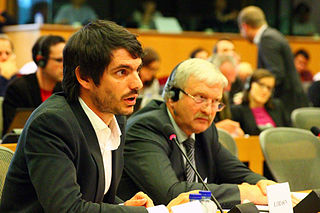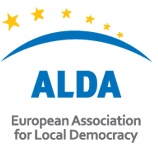
The Council of Europe is an international organisation whose stated aim is to uphold human rights, democracy and the rule of law in Europe. Founded in 1949, it has 47 member states, with a population of approximately 820 million, and operates with an annual budget of approximately 500 million euros.

The European Union (EU) is a political and economic union of 27 member states that are located primarily in Europe. Its members have a combined area of 4,233,255.3 km2 (1,634,469.0 sq mi) and an estimated total population of about 447 million. The EU has developed an internal single market through a standardised system of laws that apply in all member states in those matters, and only those matters, where members have agreed to act as one. EU policies aim to ensure the free movement of people, goods, services and capital within the internal market, enact legislation in justice and home affairs and maintain common policies on trade, agriculture, fisheries and regional development. For travel within the Schengen Area, passport controls have been abolished. A monetary union was established in 1999, coming into full force in 2002, and is composed of 19 EU member states which use the euro currency.

The University for Peace (UPEACE) is an intergovernmental organization with university status, established by treaty at the United Nations General Assembly in 1980 and having its main campus in Costa Rica. Its stated mission is "to provide humanity with an international institution of higher education for peace with the aim of promoting among all human beings the spirit of understanding, tolerance and peaceful coexistence, to stimulate cooperation among peoples and to help lessen obstacles and threats to world peace and progress, in keeping with the noble aspirations proclaimed in the Charter of the United Nations."

Jean-Baptiste Nicolas Robert Schuman was a Luxembourg-born French statesman. Schuman was a Christian Democrat political thinker and activist. Twice Prime Minister of France, a reformist Minister of Finance and a Foreign Minister, he was instrumental in building postwar European and trans-Atlantic institutions and was one of the founders of the European Union, the Council of Europe and NATO. The 1964–1965 academic year at the College of Europe was named in his honour.
In varietate concordia is the official motto of the European Union (EU), adopted in 2000. Its translations in the other 24 official languages of the EU have equal standing. It is inspired by its Latin-language version coined by the Italian Nobel prize winner Ernesto Teodoro Moneta: In varietate concordia or In varietate unitas, which is also used as a compromise. It is one of the newest symbols of the European Union, alongside the European flag and anthem but, unlike most, it is specific to the EU rather than originating from the Council of Europe.

Ekmeleddin Mehmet İhsanoğlu is a Turkish academic, politician and diplomat who was Secretary-General of the Organisation of Islamic Cooperation (OIC) from 2004 to 2014. He is also an author and editor of academic journals and advocate of intercultural dialogue.

Federico Mayor Zaragoza is a Spanish scientist, scholar, politician, diplomat, and poet. He served as director-general of UNESCO from 1987 to 1999. He is currently the chairman of the Foundation for a Culture of Peace and member of the Honorary Board of the International Decade for the Promotion of a Culture of Peace and Non-Violence for the Children of the World as well as the honorary chairman of the Académie de la Paix.

The United Nations Alliance of Civilizations (UNAOC) is an initiative that seeks to galvanize international action against extremism through the forging of international, intercultural and interreligious dialogue and cooperation. The Alliance places a particular emphasis on defusing tensions between the Western and Islamic worlds.
Human rights education is defined as the learning process that builds up the required knowledge, values, and proficiency of human rights of which the objective is to develop an acceptable human rights culture. This type of learning teaches students to examine their experiences from the human rights point of view enabling them to integrate these concepts into their values and decision-making. According to Amnesty International, human rights education is a way to empower people so that they can create skills and behavior that would promote dignity and equality within the community, society, and all over the world.

The United Nations Regional Information Centre (UNRIC) is one of 63 United Nations Information Centres (UNICs) around the world. Their main task is to spread the UN message, raise awareness and create understanding of issues relating to the United Nations' objectives. UNRIC serves the Western European Region by providing and disseminating UN information material, UN reports and documents, press kits, posters, fact sheets and brochures. The intention is to reach out to all segments of society and therefore the UNRIC Reference Library is open to all inquiries about the UN via telephone, e-mail and post. UN documents and publications are available in English, French and Spanish, but some material is also available in other European languages.

Martin Scheinin was the first United Nations Special Rapporteur on human rights and counter-terrorism in 2005–2011. He was selected for this position after serving for eight years (1997–2004) as member of the United Nations Human Rights Committee, the independent expert body monitoring states' compliance with the International Covenant on Civil and Political Rights. While on the Committee, he was known as a defendant of the rights of minorities and indigenous peoples and opponent of capital punishment, as well as the drafter of the Committee's General Comment No. 29 on states of emergency.

The Union for the Mediterranean is an intergovernmental organization of 43 member states from Europe and the Mediterranean Basin: the 27 EU member states, the United Kingdom and 15 Mediterranean partner countries from North Africa, Western Asia and Southern Europe. It was founded on 13 July 2008 at the Paris Summit for the Mediterranean, with an aim of reinforcing the Euro-Mediterranean Partnership (Euromed) that was set up in 1995 as the Barcelona Process. Its general secretariat is located in Barcelona, Spain.

Italian Council of the European Movement is an Italian advocacy group.

King Abdullah bin Abdulaziz International Centre for Interreligious and Intercultural Dialogue, globally known by its abbreviation, KAICIID, is an inter-governmental organization that promotes inter-religious dialogue to prevent and resolve conflict. KAICIID was opened in 2012 by the Kingdom of Saudi Arabia, the Republic of Austria and the Kingdom of Spain, following the initiative of King Abdullah of the Kingdom of Saudi Arabia. The Holy See is a founding observer. KAICIID has attracted controversy over concern with Saudi Arabia’s human rights record and restrictive domestic religious environment.

Salvatore Martinez is an Italian scholar, the first layperson president of the Rinnovamento nello Spirito Santo in Italy. President of the Vatican Foundation "International Center Family of Nazareth" and personal representative of the OSCE Chairperson-in-Office 2018 on Combating Racism, Xenophobia and Discrimination, also focusing on Intolerance and Discrimination against Christians and Members of other Religions".
The Historical Archives of the European Union (HAEU), located in Florence (Italy), is the official archives for the historical documents of the Institutions of the European Union. It is also a research centre dedicated to the archival preservation and study of European integration and is part of the European University Institute (EUI).

Ernest Urtasun Domenech is a Spanish ecosocialist politician. He serves as Member of the European Parliament since 2014, integrated within the Greens–European Free Alliance (Greens/EFA) political group.

Media freedom in the European Union is a fundamental right that applies to all member states of the European Union and its citizens, as defined in the EU Charter of Fundamental Rights as well as the European Convention on Human Rights. Within the EU enlargement process, guaranteeing media freedom is named a "key indicator of a country's readiness to become part of the EU".

ALDA, the European Association for Local Democracy, is a membership based organisation established in 1999 at the initiative of the Council of Europe's Congress of Local and Regional Authorities. ALDA works on the promotion of good governance and citizen participation at the local level, focusing on activities that facilitate cooperation between local authorities and civil society in the European Union and its Neighbourhood.

Basic human rights in Italy includes freedom of belief and faith, the right of asylum from undemocratic countries, the right to work, and the right of dignity and equality before the law. Human rights are the basic rights of every citizen in every country. In Italy, human rights have developed over many years and Italy has education on human rights. In addition, Italy has specific human rights for women, children and LGBT people. There are some organizations support human rights in Italy.